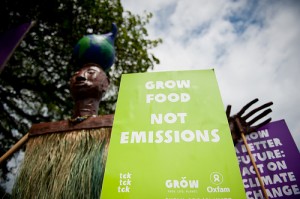Hardball history: On the edge of politics, advocacy, and activism
25 March 2015 – Cathy Stanton
advocacy, methods, social justice, public engagement, profession, politics, conference, ethics, Hardball History

Photo credit: Caro
To borrow Shakespeare’s phrase, some public history work is born political, some becomes political, and some has politics thrust upon it. Whether we intentionally locate ourselves in controversial settings, have something blow up in our faces, or encounter less spectacular kinds of resistance or misunderstanding, we’re always on the edge of the political, even when we don’t set out to be.
This fundamental tension within the field will be the subject of a structured conversation at the National Council on Public History Annual Meeting next month, in a session called “Hardball History: Public Historians on the Edge of Politics, Advocacy, and Activism.” Between now and then, the participating panelists will kick things off with a series of blog posts that we hope will lead to some pre-conference discussion and help shape our session in Nashville.
For a range of reasons, most public historians are reluctant to describe themselves as advocates, activists, or political actors per se. Deeply-held values within the historical profession still tend to place advocacy in direct opposition to analytical rigor. Funding and institutional factors make us leery of projects construed as political or partisan. And the laudable vision of museums and other civic institutions as inclusive “third places” may trump our wish to support a particular cause or community.
Yet many of us are also motivated by values that lead us to challenge exclusionary or limiting narratives about the past and to question–and sometimes to confront–the workings of power in both past and present.
Perhaps one of the most important things to recognize about this tension is that it’s hardly unique to public history. Everyone doing cultural or knowledge work in the public realm–teachers, archeologists, social scientists, artists–faces potential pushback when their work touches a nerve somewhere. The fact that many of us are in peripheral positions ourselves, often operating on “soft money” and continually called on to justify ourselves within our own institutions, certainly doesn’t help. Over my years of doing ethnographic research among knowledge workers, I’ve seen many practitioners second-guessing and censoring themselves out of concern that their work might provoke controversy or offend someone.
As a professional community, public historians have tended to focus mostly on the cases where something did blow up–the big “Enola Gay” moments–using those as cautionary tales about what to avoid in the future. In our session, we’re hoping to put forward a different, more positive approach to existing in this challenging but also potentially generative edge environment.
Yolanda Chávez Leyva and Cynthia Renteria will be writing about their experiences at Museo Urbano, a community-based museum created in response to the impending redevelopment of a Mexican American/Mexican immigrant barrio in El Paso, Texas. Dan Kerr will reflect on his practice doing oral histories with unhoused people in Cleveland and Washington, DC. Nancy Berlag will discuss the crucial task of looking at underlying reasons for controversy and seeing those in relation to the values that animate historical scholarship and practice. And to wrap up the series, session chair Denise Meringolo will begin to tease out some of the big questions emerging from our posts.
We’re guessing that these will likely circle around issues of:
- Objectivity and rigor – Is partisanship necessarily incompatible with methodological and analytical rigor? How does this overlap with the problem of non-historians not recognizing the inescapably interpretive nature of what we’re doing, even at our most “objective”?
- Location and alignment – How do we decide what issues and which partners to risk our professional capital for? How do we defend our choices once we’ve made them? Are there “safe” and “risky” locations and histories or do we need to look elsewhere for the underlying reasons that controversies arise?
- Alliances and entanglements – Where are the relationships and resources that can support “edgy” and challenging projects? How can we recognize and counter the often-subtle, often-internalized and institutional pressures that work against operating on that edge?

Signs at a 2011 march in Durban, South Africa. Photo credit: Oxfam International
This introductory post has been more general than specific, but I do want to say something about how and why I’ve tried to locate as much of my own recent public history practice as possible in dialogue with environmental advocacy and activism, particularly in the realm of the “local food” movement.
In a nutshell, I’m positioning myself there because it feels unethical not to attach my skills in some way to the very broad and complicated efforts to address the consequences of anthropogenic climate change. This feels like an “all hands on deck” moment to me, with fossil-fuel-powered, globally scaled capitalism at the root of so many of the big problems we’re wrestling with at present. Our food systems are a part of all that, and they present a particularly accessible angle from which to approach issues of energy use, racial and economic disparities, human and ecological health, and much more.
The people and organizations I’ve been partnering with are all part of the movement to rethink and rescale food systems more locally or regionally. This is admittedly a partisan stance allied to a specific set of goals. But that doesn’t mean I’ve checked my critical sensibilities at the door. I admire the intelligence and rigor of many of the questions being asked around the food movement, and I hope I can help make them stronger and more fully informed by a careful knowledge of the agricultural past.
Like my fellow panelists whose blog posts follow, I’ve made a commitment to a cause and a project because it felt to me like the right thing to do, and I’m working out the details–how to balance intellectual, interpretive, and pragmatic agendas, how to find time and support for “edgy” enterprises–as I go along. It’s the most stimulating and satisfying public history work I’ve done to date and that alone makes me think I’m on the right track in pursuing it.
I look forward to the conversation that develops here in the blog and at the conference in Nashville.
~ Cathy Stanton is a Senior Lecturer in Anthropology at Tufts University and the Digital Media Editor for the National Council on Public History.




Thank you, so much for taking the time to gather important ideas and observations on this issue here. It is inspiring and challenging — challenging for all the right reasons. Excited to read the posts that follow.
Important questions and looking forward to seeing the various ways they are addressed. What is history, public or otherwise, if not a critical pursuit?